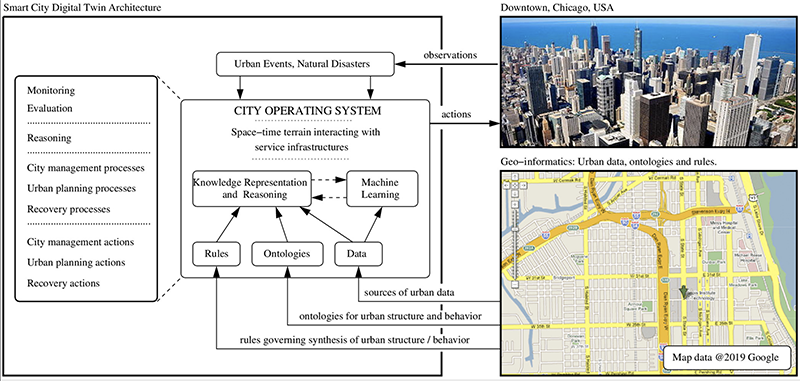News Story
Mark Austin is PI for new DoD Minerva Research Initiative project

Above: Principal Investigator Mark Austin. Below: Co-PI Jennifer Golbeck.
On May 26, The Department of Defense announced $18 million in grants to 11 university-based faculty teams under its Minerva Research Initiative, which supports basic research in social and behavioral sciences on topics of particular relevance to U.S. national security.
ISR-affiliated Associate Professor Mark Austin (CEE) is the principal investigator for “Semantic Foundations and Formal Methods for Evolutionary System-of-System Architectures.” The broad topic area of the project is “Management and information in the defense environment.” Austin is an expert in civil systems, semantic modeling, digital twins for urban networked systems, machine learning and systems engineering.
UMD alum and faculty member Jennifer Golbeck (Ph.D. Computer Science 2005) joins Austin as the co-PI. An expert in social networks, social media, and privacy, she is a Professor in the College of Information Studies and a past director of the Human-Computer Interaction Lab.
About the research
Many factors burden current military systems, making it hard for them to rapidly integrate and deploy new technologies. Rigid management structures, services rivalries, national and local politics, aging management processes, and a lack of digitalization contribute to inferior levels of performance and agility. These sources of complexity point to a strong need for new approaches to understand, model, synthesize and optimize the operations of large-scale, distributed institutions and organizations (also known as “system-of-systems” or SoS).
Austin’s multidisciplinary research team has expertise spanning economic and geopolitical modeling of institutions, information and trust modeling, and SoS modeling. Their project will explore the benefits of semantic foundations and formal methods for synthesizing and formally analyzing evolutionary SoS decision models.
This new research will fundamentally contribute to linking institutional governance and networked organizational behavior modeling to formal approaches to compositional behavior modeling and evaluation of evolutionary system-of-systems (SoS) architectures. Results will represent a significant step toward interoperable, reconfigurable, and traceable system capabilities.
“Our research will provide the ability to imagine and explore alternative institutional designs,” Austin said. “This includes organizational structures (ontologies), their incentives (rules, laws, norms), and the data used for decision making (measures that matter) that can achieve agility and, conversely, do not in the context of uncertainty. We will map dynamic networks of multi-domain semantic graphs to Joint Forces defense operations, providing a framework for data-driven decision making at the speed of relevance.”
About this year’s awards
Through its network of faculty investigators, the Minerva Research Initiative builds strong connections to the social science community to help DoD better understand and prepare for future challenges
The 11 university awardees were selected from approximately 130 applicants in six categories, using a merit competition that evaluated proposals for their potential to make foundational contributions to basic social science and alignment with the priorities established in the National Defense Strategy. Research proposals were peer-reviewed and selected for scientific merit, relevance, and potential impact in conference between R&E and the Office of the Under Secretary of Defense for Policy.
“We live in a dynamic world, and many of the challenges we face are social or have social elements to them,” said Dr. David Montgomery, director of social science in the Office of the Under Secretary of Defense for Research and Engineering (R&E). “Leveraging the strengths of the nation’s academic research institutions helps DoD define sources of present and future conflicts, with an eye toward better understanding the social and political trajectories of key regions of the world.”
Other projects selected:
Deterrence in Space—Integrated or Entangled? A Wargaming Approach to Multidomain Strategy
Principal Investigator: Mariel Borowitz, Georgia Institute of Technology
Advancing Social Science Research on Demographic Shifts, Climate Change, and Political and Social Stability in Sub-Saharan Africa
Principal Investigator: Arun Agrawal, University of Michigan
Social Network Websites, Kremlin Propaganda, and Internet Usage Patterns Among Russians
Principal Investigator: Golfo Alexopoulos, University of South Florida
The Climate-Food-Urbanization Nexus and the Precursors of Instability in Africa
Principal Investigator: Kathy Baylis, University of California Santa Barbara
Future Fish Wars: Chasing Ocean Ecosystem Wealth
Principal Investigator: James Watson, Oregon State University
Integrated Deterrence: Episodic Analysis
Principal Investigator: Eli Berman, University of California, San Diego
Resurgent Powers, Nontraditional Threats, and Emerging Technologies: Deterrence in a Multi-level Network Framework
Principal Investigator: Brandon Kinne, University of California, Davis
Cross-cultural Multilevel Examination of Power and Influence
Principal Investigator: Jasmin Cloutier, University of Delaware
Identifying and Measuring User and Platform Vulnerabilities to Strategic Information Operations
Principal Investigator: Brian Ekdale, University of Iowa
Food Fights: War Narratives and Identity Reproduction in Evolving Conflicts
Principal Investigator: Hanna Kassab, East Carolina University
About the Minerva Research Initiative
The Minerva Research Initiative is jointly administered by the Basic Research Office in R&E and the Strategy and Force Development Office in the Office of the Under Secretary of Defense for Policy, in partnership with the Air Force Office of Scientific Research and the Office of Naval Research.
The Initiative supports social science research aimed at improving our basic understanding of security, broadly defined. All supported projects are university-based and unclassified, with the intention that all work be shared widely to support thriving stable and safe communities. The goal is to improve DoD’s basic understanding of the social, cultural, behavioral, and political forces that shape regions of the world of strategic importance to the U.S.
Launched by the Secretary of Defense in 2008, the Minerva Research Initiative is a DoD-sponsored, university-based social science research initiative that focuses on areas of strategic importance to the U.S. national security policy.
The Minerva Research Initiative has a unique relationship between Research and Policy within the DoD, being jointly administered by the Office of Basic Research and the Office of Policy at the US Department of Defense. As such, leadership across the department collaborate to identify and support basic social science research issues in need of attention and to integrate those research insights into the policy-making environment. In doing this, the leadership team closely works with the program managers within the military service branches.
About USD(R&E)
The Under Secretary of Defense for Research and Engineering is the Chief Technology Officer of the Department of Defense. The USD(R&E) champions research, science, technology, engineering, and innovation to maintain the United States military’s technological advantage. Learn more at www.cto.mil, follow us on Twitter @DoDCTO, or visit us on LinkedIn at https://www.linkedin.com/company/ousdre.
| Department of Defense press release | Minerva Research Initiative website |
Published June 5, 2023












